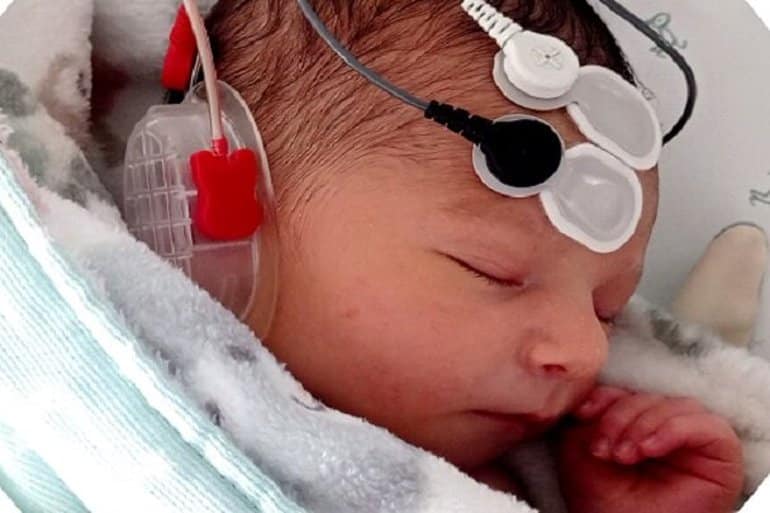Summary: Exposure to music or the sound of the mother singing while in the womb was associated with better neural encoding of speech sounds in infants.
Source: University of Barcelona
When pregnant women sing to their babies or listen to music on loudspeakers during their pregnancy, babies are born with a better ability for neuronal encoding of speech sounds.
This is one of the main conclusions of a study led by Professor Carles Escera, head of Brainlab—Research Group on Cognitive Science at the Faculty of Psychology of the University of Barcelona, the Institute of Neurosciences of the UB (UBNeuro) and the Sant Joan de Déu Research Institute (IRSJD).
The results of this paper, published in the journal Developmental Science, provide new perspectives on the effects of prenatal musical exposure about language stimuli using a specific brain response: the frequency-following response (FFR), a neurophonic auditory evoked potential that informs about the appropriate neural coding of speech sounds.
According to the conclusions, daily musical exposure during the last weeks of the pregnancy is associated with an improved encoding of low-frequency sound compounds, which could improve the newborn’s perception of the tone.
The study was carried out in collaboration with the expert Maria Dolores Gómez-Roig, head of Obstetrics and Gynecology at Sant Joan de Déu Hospital and researcher at the Sant Joan de Déu Research Institute (IRSJD). The study includes the participation of researcher Teresa Ribas-Prats (UB-UBNeuro-IRSJD), who had already worked with this technique in a previous exploratory study in 2019.
FFR records and speech stimuli
The frequency-following response (FFR) is conditioned by a variety of speech and language impairments, and has shown to be affected by the fetal environment and the prenatal acoustic environment. Therefore, the researchers of the study propose that this measure could be used as a biomarker to detect the risk of language impairment and to establish preventive measures early in life.
The study is based on the comparison of FFR recordings in 60 healthy newborns (aged between 12 and 72 hours), including 29 who were exposed daily to music during the prenatal period and 31 who were not exposed to music.

Specifically, the encephalogram recordings of the babies were analyzed for two different speech stimuli: the /da/ stimulus—the most commonly used in FFR and newborn research—and /oa/, which allows analysis of the frequency coding to which the newborn was exposed in the womb.
Neural plasticity and hearing in babies
The study reveals that daily exposure to music during the last trimester of pregnancy is associated with more robust coding of speech stimuli.
Prenatal exposure to music is associated with fine-tuned coding of the fundamental frequency of human speech, which may facilitate processing and early language acquisition.
“The musical stimulus reaches the auditory system with low-frequency rhythmic components that train it to organize neural plasticity,” says the doctoral student Sonia Arenillas-Alcón, first author of the article and member of the Brainlab—Cognitive Neuroscience Research Group.
The researchers also found that exposure to music during pregnancy has no effect on the speed of neural transmission, in contrast to the faster processing speed of auditory and speech stimuli identified in musically trained adults, which is the result of the myelination of the underlying neural structures.
“This is only the first step towards a specific clinical application after the necessary follow-up studies,” says Professor Carles Escera. “Therefore, children with an attenuated brain response, for example, underweight born babies, could benefit from a musical intervention program.
About this neurodevelopment research news
Author: Press Office
Source: University of Barcelona
Contact: Press Office – University of Barcelona
Image: The image is credited to University of Barcelona
Original Research: Open access.
“Prenatal daily musical exposure is associated with enhanced neural representation of speech fundamental frequency: Evidence from neonatal frequency‐following responses” by Sonia Arenillas‐Alcón et al. Developmental Science
Abstract
Prenatal daily musical exposure is associated with enhanced neural representation of speech fundamental frequency: Evidence from neonatal frequency‐following responses
Fetal hearing experiences shape the linguistic and musical preferences of neonates. From the very first moment after birth, newborns prefer their native language, recognize their mother’s voice, and show a greater responsiveness to lullabies presented during pregnancy. Yet, the neural underpinnings of this experience inducing plasticity have remained elusive.
Here we recorded the frequency-following response (FFR), an auditory evoked potential elicited to periodic complex sounds, to show that prenatal music exposure is associated to enhanced neural encoding of speech stimuli periodicity, which relates to the perceptual experience of pitch.
FFRs were recorded in a sample of 60 healthy neonates born at term and aged 12–72 hours. The sample was divided into two groups according to their prenatal musical exposure (29 daily musically exposed; 31 not-daily musically exposed).
Prenatal exposure was assessed retrospectively by a questionnaire in which mothers reported how often they sang or listened to music through loudspeakers during the last trimester of pregnancy. The FFR was recorded to either a /da/ or an /oa/ speech-syllable stimulus. Analyses were centered on stimuli sections of identical duration (113 ms) and fundamental frequency (F0 = 113 Hz).
Neural encoding of stimuli periodicity was quantified as the FFR spectral amplitude at the stimulus F0. Data revealed that newborns exposed daily to music exhibit larger spectral amplitudes at F0 as compared to not-daily musically-exposed newborns, regardless of the eliciting stimulus.
Our results suggest that prenatal music exposure facilitates the tuning to human speech fundamental frequency, which may support early language processing and acquisition.






